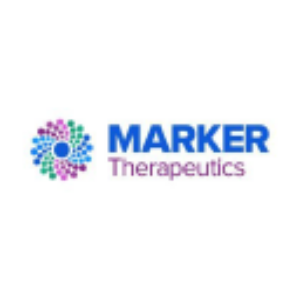Marker Therapeutics Provides Update on Phase 1 APOLLO Study Highlighting Encouraging Overall Response Rates in Relapsed Lymphoma
Rhea-AI Summary
Marker Therapeutics (NASDAQ:MRKR) has reported encouraging results from its Phase 1 APOLLO study investigating MT-601, a Multi-Antigen Recognizing T cell product, for treating relapsed lymphoma. The study demonstrated a 66% objective response rate in Non-Hodgkin Lymphoma (NHL) patients, with 50% achieving complete response.
The trial included 24 B-cell lymphoma patients across 7 U.S. clinical sites, with doses ranging from 100x106–400x106 cells. Notable outcomes include 78% objective response rate in Hodgkin Lymphoma patients and durable responses lasting 3-24 months. The treatment showed a favorable safety profile with no dose-limiting toxicities or serious adverse events.
The company is advancing to the dose expansion phase, investigating MT-601 at the maximum dose of 400x106 cells in DLBCL patients who have relapsed after or are ineligible for CAR-T therapy.
Positive
- 66% objective response rate in NHL patients with 50% complete response rate
- 78% objective response rate in Hodgkin Lymphoma patients
- Durable responses observed up to 24 months with 5 patients showing continued response ≥6 months
- Favorable safety profile with no dose-limiting toxicities or serious adverse events
- Successfully cleared maximum dose (400x106 cells) for dose expansion phase
Negative
- Only 1 complete response (11%) achieved in Hodgkin Lymphoma patients
- Two reported Grade 1 cytokine release syndrome events
News Market Reaction
On the day this news was published, MRKR declined 20.63%, reflecting a significant negative market reaction. Argus tracked a peak move of +21.5% during that session. Argus tracked a trough of -42.0% from its starting point during tracking. Our momentum scanner triggered 27 alerts that day, indicating elevated trading interest and price volatility. This price movement removed approximately $4M from the company's valuation, bringing the market cap to $16M at that time. Trading volume was exceptionally heavy at 286.1x the daily average, suggesting significant selling pressure.
Data tracked by StockTitan Argus on the day of publication.
Ongoing Phase 1 APOLLO study investigating MT-601 in patients with relapsed B cell lymphoma showed
Favorable safety profile observed in study participants with no dose limiting toxicities (DLTs) or immune-effector cell associated neurotoxicity syndrome (ICANS) in the dose escalation cohort
Dose expansion phase of study will investigate MT-601 at pre-specified maximum dose in patients with Diffuse Large B Cell Lymphoma (DLBCL) who have relapsed after or are ineligible for chimeric antigen receptor (CAR)-T cell therapy
Live Webcast to be held today to discuss results at 8:30 a.m. ET
HOUSTON, Aug. 26, 2025 (GLOBE NEWSWIRE) -- Marker Therapeutics, Inc. (Nasdaq: MRKR), a clinical-stage immuno-oncology company focusing on developing next-generation T cell-based immunotherapies for the treatment of hematological malignancies and solid tumor indications, today provided an update on the progress and clinical observations from the Phase 1 APOLLO study.
The Company’s Phase 1 APOLLO study (clinicaltrials.gov identifier: NCT05798897) is a multicenter, open-label clinical study investigating MT-601, a Multi-Antigen Recognizing (MAR)-T cell product, in patients with lymphoma who have relapsed after anti-CD19 CAR-T cell therapy or for whom anti-CD19 CAR-T cell therapy is not an option. Today, Marker is reporting an update on the safety and efficacy data from the dose escalation portion of the study showing a favorable safety profile across all evaluated doses (dose range 100x106–400x106 cells) and a
A total of 24 B-cell lymphoma patients have been treated with MT-601 across 7 U.S. clinical sites, including 15 patients with Non-Hodgkin Lymphoma (NHL) and 9 patients with Hodgkin Lymphoma (HL). At the time of the data cutoff (June 2025), 12 NHL and 9 HL patients have been assessed. Patients with NHL and HL received doses ranging from 100x106–400x106 cells and showed objective responses and a favorable safety profile.
“We are very excited and encouraged by the progress of the study,” said Juan Vera, M.D., President and CEO of Marker Therapeutics. “The safety and preliminary efficacy data from our Phase 1 APOLLO study underscore the potential of MT-601 in heavily pre-treated patients with lymphoma, who have relapsed after multiple lines of therapy, including CAR-T cells and bispecific antibodies. While CAR-T cells have gained acceptance in the treatment of lymphoma, with approximately 8,000 patients treated globally in 2024, 40
Efficacy and Duration of Response
The 12 NHL patients received doses ranging from 100x106–200x106 cells and had undergone multiple lines of therapy (median of 5 prior lines of therapy), including anti-CD19 CAR-T cells (n=9) and bispecific antibodies (n=4); dual exposed patients (n=4). 8 out of 12 NHL patients had objective responses (
HL patients received doses ranging from 200x106–400x106 cells and had undergone a median of 8 prior lines of therapy. Seven out of 9 HL patients had objective responses (
Safety Profile
The dose escalation portion of the study tested doses ranging from 100x106–400x106 cells in patients with B-cell lymphoma. To date, no DLTs have been reported at the highest dose (400x106 cells). Infusion of MT-601 was well tolerated in all study participants, with no observation of ICANS and two reported Grade 1 cytokine release syndrome (CRS) events (fever; no treatment was required). Patients were treated with or without lymphodepleting chemotherapy prior to receiving infusions of MT-601. No change in DLTs or ICANS was observed between patients treated with and without lymphodepletion. Data collected from the 24 patients treated demonstrated a robust safety profile with no reported serious adverse events reinforcing the benefit of MT-601.
Study Design and Dose Expansion
The Phase 1 APOLLO study is composed of a dose escalation phase, followed by a dose expansion phase. The dose escalation cohort evaluated the safety and optimum dose level of MT-601 with doses ranging from 100x106–400x106 cells. On June 17, the Safety Review Committee (SRC) cleared the pre-specified maximum dose (400x106 cells) for the dose expansion portion of the trial. The dose expansion will enroll patients with DLBCL who have relapsed after anti-CD19 CAR-T cells or who are ineligible for CAR-T therapy.
“The observed outcomes in NHL demonstrate that certain patients can achieve clinically meaningful responses with MT-601 even at lower doses of 100x106 or 200x106 cells,” commented Dr. Vera. “We look forward to advancing the study to the dose expansion phase, where we will investigate MT-601 at the maximum dose of 400x106 cells in patients with relapsed DLBCL to potentially build upon these promising results.”
Dr. Vera continued, “The encouraging efficacy in patients with NHL was achieved at doses ranging from 100x106–200x106 cells. We believe that investigating MT-601 at the maximum dose of 400x106 cells in the dose expansion cohort could have the potential to further improve the clinical efficacy and durability we are currently observing in patients with NHL. It is particularly encouraging that even at the highest dose level no DLTs were reported in the dose escalation phase. We will continue to closely monitor the safety and efficacy of MT-601 in treated patients and anticipate to provide another data update in the first half of 2026.”
Webcast Details
Marker will host a live, online-only webcast today at 8:30 am E.D.T. to discuss the clinical results and provide a corporate update. To attend the live event, please use this link to register. During the event, attendees will have the opportunity to submit written questions via the webcast platform’s Q&A feature. After the event, a recording will be made available for replay on the Company’s IR website under Events & Presentations for approximately 30 days.
About MT-601
The Company’s lead product, MT-601, is a multi-antigen recognizing (MAR) T cell product that utilizes a non-genetically modified approach that specifically targets six different tumor antigens upregulated in lymphoma cells (Survivin, PRAME, WT-1, NY-ESO-1, SSX-2, MAGEA-4). Marker is currently investigating MT-601 in the Company-sponsored Phase 1 APOLLO trial (clinicaltrials.gov identifier: NCT05798897) for the treatment of patients with lymphoma who have relapsed after or are not candidates for anti-CD19 CAR-T cell therapies.
About APOLLO
The APOLLO trial (clinicaltrials.gov Identifier: NCT05798897) is a Phase 1, multicenter, open-label study designed to evaluate the safety and efficacy of MT-601 in participants with relapsed or refractory lymphoma who have either failed anti-CD19 chimeric antigen receptor (CAR) T cell therapy or are not candidates for anti-CD19 CAR-T cell therapy. The primary objective of this exploratory Phase 1 clinical trial is to evaluate the optimum dose, safety, and preliminary efficacy of MT-601 in participants with various lymphoma subtypes. The APOLLO study is supported by the National Cancer Institute of the National Institutes of Health under Award Number R44CA291521.
About MAR-T cells
The multi-antigen recognizing (MAR) T cell platform (formerly known as multiTAA-specific T cells) is a novel, non-genetically modified cell therapy approach that selectively expands tumor-specific T cells from a patient's/donor’s blood capable of recognizing a broad range of tumor antigens. Unlike other T cell therapies, MAR-T cells allow the recognition of hundreds of different epitopes within up to six tumor-specific antigens, thereby reducing the possibility of tumor escape. Since MAR-T cells are not genetically engineered, Marker believes that its product candidates will be easier and less expensive to manufacture, with an improved safety profile compared to current engineered T cell approaches and may provide patients with meaningful clinical benefits.
About Marker Therapeutics, Inc.
Marker Therapeutics, Inc. is a Houston, TX-based clinical-stage immuno-oncology company specializing in the development of next-generation T cell-based immunotherapies for the treatment of hematological malignancies and solid tumors. The Company was founded at Baylor College of Medicine, and clinical trials that enrolled more than 200 patients across various hematological and solid tumor indications showed that the Company’s autologous and allogeneic MAR-T cell products were well tolerated and demonstrated durable clinical responses. Marker’s goal is to introduce novel T cell therapies to the market and improve patient outcomes. To achieve these objectives, the Company prioritizes the preservation of financial resources and focuses on operational excellence. Marker’s unique T cell platform is strengthened by non-dilutive funding from U.S. state and federal agencies supporting cancer research.
To receive future press releases via email, please visit: https://www.markertherapeutics.com/email-alerts.
Forward-Looking Statements
This release contains forward-looking statements for purposes of the safe harbor provisions of the Private Securities Litigation Reform Act of 1995. Statements in this news release concerning the Company’s expectations, plans, business outlook or future performance, and any other statements concerning assumptions made or expectations as to any future events, conditions, performance or other matters, are “forward-looking statements.” Forward-looking statements include statements regarding our intentions, beliefs, projections, outlook, analyses or current expectations concerning, among other things: our research, development and regulatory activities and expectations relating to our non-engineered multi-tumor antigen specific T cell therapies; the effectiveness of these programs or the possible range of application and potential curative effects and safety in the treatment of diseases; and the timing, conduct, interim results announcements and outcomes of our clinical trials of our product candidates, including MT-601 for the treatment of patients with lymphoma. Forward-looking statements are by their nature subject to risks, uncertainties and other factors which could cause actual results to differ materially from those stated in such statements. Such risks, uncertainties and factors include, but are not limited to the risks set forth in the Company’s most recent Form 10-K, 10-Q and other SEC filings which are available through EDGAR at WWW.SEC.GOV. The Company assumes no obligation to update its forward-looking statements whether as a result of new information, future events or otherwise, after the date of this press release except as may be required by law.
Media and Investor Contact
Marker Therapeutics, Inc.
+1 (713) 400-6400
investor.relations@markertherapeutics.com








